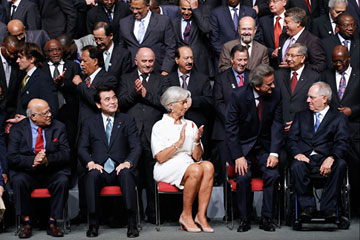
Lagarde, center, at a meeting of the International Monetary Fund and World Bank in Tokyo. She has led the IMF since 2011.
(3 of 4)
With the proposal she had opposed now in tatters, Lagarde again pressed the case for E.U. reform. At a conference of German bankers in Frankfurt on March 19, she zeroed in on one message: Europe needs a strict, E.U.-wide banking union, and quickly. In an effort to stave off repeated disasters, E.U. finance ministers have already agreed to have the ECB oversee about 6,000 banks in the 17 countries that use the euro as their currency and bar them from taking on mountains of debt--as the banks in Cyprus had done. Looking out at the audience of gray suits, Lagarde called on her years of experience as managing partner of U.S. law firm Baker & McKenzie: "I've been in business. You are all in business." Europe, she told them, is only "half-built and half-safe."
The agreement hammered out by the troika and the Cypriot government in the early hours of March 25 put in place strict new capital controls in Cyprus. This was much closer to the bank overhaul that Lagarde had wished for. "This agreement provides the basis for restoring trust in the banking system, which is key to supporting growth," she told reporters. But the price of trust will be painful. The country's second largest bank will be shuttered, and many foreign depositors will likely take their billions elsewhere. Without its tax-haven status, the Cypriot economy is expected to shrink dramatically, and thousands of jobs will be lost. "It's not just Christine Lagarde who's to blame," says Eleni Kyriakou, 45, who has worked at Bank of Cyprus as a clerical employee for 21 years. "It's the IMF, it's Europe, it's our own leadership. I just don't understand what their goal is. So they want to destroy us as a country?"
Some of Lagarde's partners in the E.U. aren't happy either. The Cyprus talks revealed clashing visions, with the IMF and ECB pushing for serious reforms even as some E.U. officials tried to come up with a deal that was more palatable to the Cypriot government. For all the political capital Lagarde expended on the Cyprus deal, it gets her only a little closer to the goal of a unified E.U. banking system. She believes the system--similar to the U.S. Federal Reserve--would "anchor, in the medium and long term, this European reality that was the dream of the founders of Europe."
In the meantime, she must deploy her charm to rally the rest of the IMF's members. (In early April, she travels to Beijing, a key contributor to the fund.) It won't be easy to convince non-European countries that bailing out the wealthy continent of Europe is a worthwhile use of their money; a resolution to make permanent the U.S.'s contribution is stalled in Congress. "It's like the U.S. telling the world it has to bail out California," says Simon Tilford, chief economist at the Center for European Reform in London. "The rest of the world would say, 'Stuff off,' and that is pretty much how they feel [about Europe]." Still, he says, "I don't think anyone could have done a better job than she is doing."
Back home, Lagarde faces another headache. French police recently raided her apartment in Paris as part of a criminal investigation into her role in a $367 million government-compensation package to a French businessman in 2008, while she was Finance Minister. Lagarde denies any wrongdoing, but if, as some speculate, she someday runs for office in France, the investigation could complicate things.
